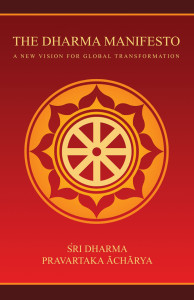 A New Vision for Global Transformation
A New Vision for Global Transformation
by Sri Dharma Pravartaka Acharya
Historically, a truly revolutionary transition away from the prevailing corrupt order is only accomplished when such change is preceded by a manifesto that outlines the goals and strategy of such change. There is no significant change within society without such a written work as a guide. “The Dharma Manifesto” is that book for our era.
The concept that is encapsulated in the word “Dharma”, which in the ancient Sanskrit language means “Natural Law”, is predicated upon the recognized need for the organic and munificent sacralization of culture and of all human concern, as well as the manifestation of the highest potentials attainable by each human person in society. “The Dharma Manifesto” is designed to serve as a systematic revolutionary manifesto signaling the beginning of a wholly new era in humanity’s eternal yearning for meaningful freedom and happiness.
Paperback, 196pgs
$23.10
Publisher: Arktos Media
ORDER HERE
The Dharma Manifesto Table of Contents
Table of Contents
Dedication
Introduction
Acknowledgements
Chapter 1 FOUNDATIONAL PHILOSOPHY
Why the Term “Dharma”?
Natural Law: The Foundation of all Advanced Ancient Civilizations
Dharma Theory
A Philosophical Anthropology
Transmutation of Consciousness and Genetic Morphology
The People
The Nation
The State
Principle of the Ideal Leader
The Ethical Foundation of Governing Authority
The Dharma Nation Concept
Chapter 2 APPLIED PHILOSOPHY
Dharma Nationalism
Reconciling Spirituality with Political Activism
What We Stand For
Neither Liberal Nor Conservative
Reaction, Revolution and Dharma Renaissance: The Case of “Hindu Nationalism”
Prabhupada’s Varnashrama Strategy
Chapter 3 OPPOSITION TO THE NATURAL WAY
Abrahamism
Conflict Theory (Virodha Vardhana-Vada)
Comparison of Abrahamism with Dharma
Judaism
Pauline Christianity
Islam
Marxism
The Failures of Marxism
Comparison of Marxism with Dharma
Atheism
Satanism
Radical Egalitarianism
Radical Universalism
Relativism
Secular Materialism
Chapter 4 HISTORICAL AND CONTEMPORARY CONDITIONS
The Crisis of Modernity
An Age in Transition
The Two Revolutions
Utilitarian Futility
Conflict Theory Instantiated
The Post Secular Age
Instantiating Natural Law in the Social-Political Arena
Chapter 5 GOVERNANCE AND POLICY ISSUES
Quality of Life Issues
Primacy of Quality of Life Issues
Centrality of Spirituality and Religion in Civil Society
Promoting a Life-Affirming Culture
Individual Character and Accountability
Meritocracy
Governance Policy
Minimal Government
Large-scale Reduction of all Government Bureaucracy
Large-scale Decentralization of Governmental Authority
Empowerment of Local Communities
Proper Tasks of Government
Domestic Policy
The Twelve Planks of Dharmic Domestic Policy
Energy Policy
Education
Health Policies
Local Councils of Arts and Culture
Architecture and City Planning
Ruralism
Strong National Defense
Immigration
English as the Official Language of Government
Requirements for Naturalized Citizenship
National Voter ID Card
Voting Eligibility
Environmental Sustainability and Protection
Animal Protection
Genuine War on Crime and Corruption
Capital Offense Sentencing
Promotion of Organic Family Structure
Children’s Welfare
Abortion
LGBT Issues
Same-Sex Marriage
Pornography and Sexual Exploitation
Foreign Policy
General Principles of Foreign Policy
The Three Nation Types
Bio-cultural Identity and Diversity
National Self-Determination
Population Planning and Balance
Israel Policy
Iran Policy
China Policy
India Policy
Pakistan Policy
European Union Policy
Russia Policy
A Natural Global Order – Not a New World Order
United Nations
Sanskrit: The Universal Language
Preservation of Ancient Cultures
Economic Policy
Economics
Neither Capitalism Nor Socialism
Class Collaboration…Not Class War
Ownership Society
The Deconstruction of Mercantile Culture
Abolition of All Incomes Unearned by Work and Creativity
Usury
Flat Tax
Thirty-five Hour Work Week
Chapter 6 STRATEGY
In Defense of Reality
The Four Elements of a Political Movement
The Three Politeias
A Meta-Political Philosophical Movement
Dharma Nationalism and Electoral Politics
Organization: The Dharma Nation Movement
Activist Cadre
Women Activists
Cadre Conduct
Nayaka-Tattva – Leadership Principle
Participatory Centralism
Activist Strategies
Embracing Empowerment
Our Audience
Defeating the Enemies of Dharma
Sanatana Dharma Jayate! Victory to the Dharma Nation
Appendices
Potential Allies of Dharma Nationalism
Dharma Nationalist Thinkers – Historical and Contemporary
International Political Tendencies
Future Global Superpowers
Bibliography
About the Author

Sri Dharma Pravartaka Acharya – Author of “The Dharma Manifesto”. Leader of the Dharma Nation Movement.

